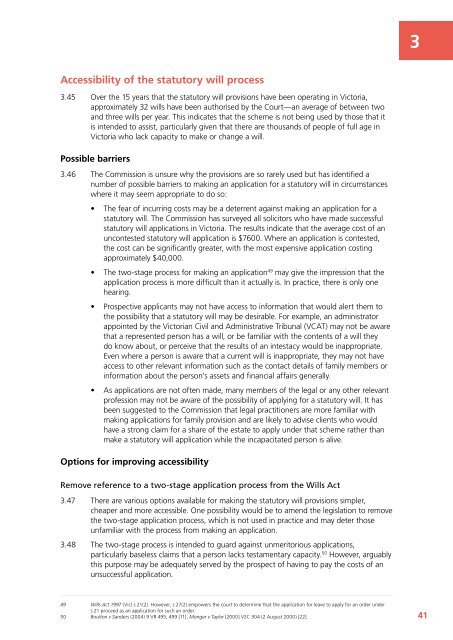Succession Laws - Victorian Law Reform Commission
Succession Laws - Victorian Law Reform Commission
Succession Laws - Victorian Law Reform Commission
Create successful ePaper yourself
Turn your PDF publications into a flip-book with our unique Google optimized e-Paper software.
3Accessibility of the statutory will process3.45 Over the 15 years that the statutory will provisions have been operating in Victoria,approximately 32 wills have been authorised by the Court—an average of between twoand three wills per year. This indicates that the scheme is not being used by those that itis intended to assist, particularly given that there are thousands of people of full age inVictoria who lack capacity to make or change a will.Possible barriers3.46 The <strong>Commission</strong> is unsure why the provisions are so rarely used but has identified anumber of possible barriers to making an application for a statutory will in circumstanceswhere it may seem appropriate to do so:• The fear of incurring costs may be a deterrent against making an application for astatutory will. The <strong>Commission</strong> has surveyed all solicitors who have made successfulstatutory will applications in Victoria. The results indicate that the average cost of anuncontested statutory will application is $7600. Where an application is contested,the cost can be significantly greater, with the most expensive application costingapproximately $40,000.• The two-stage process for making an application 49 may give the impression that theapplication process is more difficult than it actually is. In practice, there is only onehearing.• Prospective applicants may not have access to information that would alert them tothe possibility that a statutory will may be desirable. For example, an administratorappointed by the <strong>Victorian</strong> Civil and Administrative Tribunal (VCAT) may not be awarethat a represented person has a will, or be familiar with the contents of a will theydo know about, or perceive that the results of an intestacy would be inappropriate.Even where a person is aware that a current will is inappropriate, they may not haveaccess to other relevant information such as the contact details of family members orinformation about the person’s assets and financial affairs generally.• As applications are not often made, many members of the legal or any other relevantprofession may not be aware of the possibility of applying for a statutory will. It hasbeen suggested to the <strong>Commission</strong> that legal practitioners are more familiar withmaking applications for family provision and are likely to advise clients who wouldhave a strong claim for a share of the estate to apply under that scheme rather thanmake a statutory will application while the incapacitated person is alive.Options for improving accessibilityRemove reference to a two-stage application process from the Wills Act3.47 There are various options available for making the statutory will provisions simpler,cheaper and more accessible. One possibility would be to amend the legislation to removethe two-stage application process, which is not used in practice and may deter thoseunfamiliar with the process from making an application.3.48 The two-stage process is intended to guard against unmeritorious applications,particularly baseless claims that a person lacks testamentary capacity. 50 However, arguablythis purpose may be adequately served by the prospect of having to pay the costs of anunsuccessful application.49 Wills Act 1997 (Vic) s 21(2). However, s 27(2) empowers the court to determine that the application for leave to apply for an order unders 21 proceed as an application for such an order.50 Boulton v Sanders (2004) 9 VR 495, 499 [11]; Monger v Taylor [2000] VSC 304 (2 August 2000) [22].41
















